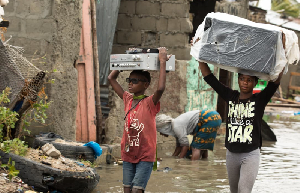African nations are losing up to 5% of their GDP annually due to climate change, bearing a heavier burden than the rest of the world, according to a report released after one of the continent’s hottest years on record.
The World Meteorological Organization (WMO) highlighted the significant financial strain on African countries, with many now dedicating up to 9% of their budgets to climate adaptation policies. This level of expenditure reflects the urgency facing African nations as they attempt to combat the effects of climate change, despite contributing less than 10% of the world’s greenhouse gas emissions.
“Africa has experienced a warming trend over the past 60 years that is accelerating faster than the global average,” WMO Secretary-General Celeste Saulo said. This rapid warming threatens food security, public health, and peace across the continent, the report said. The impact of climate change is not just a future concern, but a present reality affecting millions of lives.
Africa’s vulnerability to extreme weather events is especially alarming. The WMO report noted that, despite Africa’s minimal contribution to global greenhouse gas emissions, it is the most susceptible region to severe climate-related events, including droughts, floods, and heatwaves. These events have become more frequent and intense, exacerbating poverty and undermining development efforts.
The report pointed to 2023 as one of Africa’s three hottest years on record, a trend expected to continue. The WMO urged African governments to invest in early warning systems and meteorological services, which are critical for preparing for and responding to climate-related disasters. Without these measures, up to 118 million Africans could face life-threatening conditions such as droughts, floods, and extreme heat by 2030, the report warned.
In sub-Saharan Africa, the cost of adapting to increasingly severe weather patterns could range from $30 billion to $50 billion annually over the next decade, the report said. These costs are daunting for nations already grappling with economic challenges. The financial burden threatens to derail progress in poverty reduction, education, and healthcare, pushing millions further into hardship.
The consequences of climate change have already been felt across the continent. Between September and October 2023, about 300,000 people in West Africa were displaced by floods. At the same time, Zambia experienced its worst drought in 40 years, affecting nearly 6 million people and leading to widespread food insecurity. These events are part of a broader pattern of extreme weather increasingly defining life in Africa.
As 2024 unfolds, the trend of extreme weather shows no sign of slowing. In the Sahel region south of the Sahara, floods have already affected more than 716,000 people this year, according to the United Nations. In Mali, the government declared a national disaster last week after floods affected 47,000 people since the start of the rainy season.
West Africa also faced unprecedented heat waves earlier this year, leading to a surge in deaths and further straining public health systems ill-equipped to handle such crises. These events underscore the urgent need for comprehensive climate action, both within Africa and globally, to address the root causes of climate change and support the continent’s efforts to adapt and build resilience.
The report makes it clear that Africa is at a critical juncture. The continent’s ability to cope with the escalating effects of climate change will depend on both domestic policy decisions and international support. The future of millions of Africans hinges on the world’s response to this growing crisis.
Click to view details



Africa News of Wednesday, 4 September 2024
Source: face2faceafrica.com
African nations lose 5% of GDP to climate change after experiencing one of the hottest years on record
 File photo of a family displaced by flood - Photo credit: Denis Onyodi / IFRC / DRK / Climate Centre
File photo of a family displaced by flood - Photo credit: Denis Onyodi / IFRC / DRK / Climate Centre
















